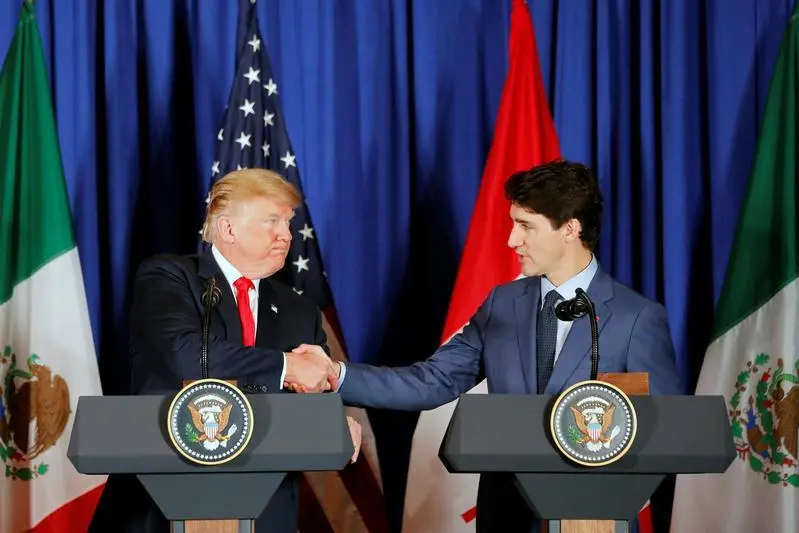PHOTO
SAN FRANCISCO - Canada is caught once again in the crossfire of U.S. President Donald Trump’s trade wars. Trump’s latest threat to impose tariffs on Mexico puts at risk the new version of the three-way North American Free Trade Agreement. Canada’s arrest of Huawei Technologies' chief financial officer upset Beijing. And the country’s uranium exports may now face levies, too.
The first headache for Prime Minister Justin Trudeau is the so-called U.S.-Mexico-Canada Agreement. The legislatures of the three countries need to approve the deal, which Canada seemed poised to do after America lifted steel and aluminum tariffs on its two neighbors last month. After Trump’s tariff tantrum, ostensibly over illegal immigration across the southern border, it’s now unclear how Mexican lawmakers will vote.
In Congress, the USMCA approval process has been complicated by Democrats and many Republican hoping to block the new levies. Canadian Foreign Minister Chrystia Freeland said last week that the country hoped to move in tandem with its deal partners.
Meanwhile, China blocked imports of some Canadian agricultural products and increased pork inspections after the arrest of Huawei’s Meng Wanzhou in Canada in December – an action taken as part of an extradition request from U.S. authorities. China also detained two Canadian citizens and sentenced another two to death for drug-related offenses. Before Meng’s arrest, Trudeau had been working to strengthen economic ties with Beijing, possibly through a trade deal.
Washington is also considering raising levies on imports of uranium, which is used for nuclear fuel. Canada, currently the biggest supplier, could lose out if that happens. Domestic U.S. producers have complained of unfair foreign competition, and there are also concerns about the country’s reliance on imports of such materials. On Tuesday, the Commerce Department issued a report on ways America could assure the supply of critical minerals including uranium and rare earth metals.
Trade tensions, on top of lower oil prices, have already hurt Canada’s $1.7 trillion economy, which grew at an annualized rate of just 0.4% in the first quarter while that of the United States expanded at a 3.1% pace. Economists at Bank of America on Tuesday cut their outlook for 2019 and 2020. Ottawa just can’t catch a break.
On Twitter https://twitter.com/GinaChon
CONTEXT NEWS
- The U.S.-Mexico-Canada Agreement was formally presented to the Canadian parliament on May 29 for consideration. The legislatures of all three countries need to ratify the pact, which is a revised version of the existing North American Free Trade Agreement.
- The fate of the deal is unclear after U.S. President Donald Trump said on May 30 that the United States would impose a tariff on all Mexican imports if America’s southern neighbor didn’t stop a wave of migrants crossing the border. The tariffs would gradually rise to 25% in October.
- For previous columns by the author, Reuters customers can click on
- SIGN UP FOR BREAKINGVIEWS EMAIL ALERTS http://bit.ly/BVsubscribe
(The author is a Reuters Breakingviews columnist. The opinions expressed are her own.)
(Editing by Richard Beales and Amanda Gomez)
© Reuters News 2019




















